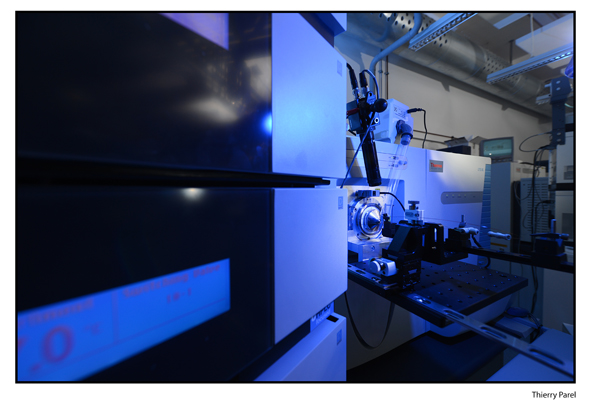Proteomics intends to globally study all proteins expressed in dedicated biological samples such as cells, tissues, biological fluids, Secretomes and so on. The field not only covers protein identifications but also their characterization, the interactions between them or their global quantification across samples. Major advances during the last decade in the field of Mass Spectrometry and related Data Treatment pipelines propelled MS-based proteomics as a tool of choice to unravel the complexity of multiple biological processes.
The Facility is currently equipped with State-of-the-Art Mass Spectrometry instrumentation operated by a highly experimented team. We permanently implement advanced MS based workflows by systematically exploring last generation applications in order to offer cutting-edge analytical techniques to our Platform users.

Our main field of activities are:
- Consulting, training and teaching on Proteomics requests
- Providing protein identification, characterization (PTMs) and interaction information from diverse biological samples
- Providing Relative Protein Quantification through Label Free, Metabolic Labeling (SILAC) or Chemical Labeling (TMT, Dimethyl…) approaches
- Providing Absolute Protein and small molecules Quantifications through SRM-MRM methods
- Providing extended Bioinformatics Data treatment, Data analysis and Visualisation
Workflow adapted depending on sample complexity and required depth of analysis (In-gel, In-solution or FASP based digestions)
- Label Free
- Isobaric and Chemical labeling based (TMT, Dimethyl)
- Metabolic labeling (SILAC)
- Targeted MRM assay developpments for absolute protein quantification
Phosphopeptides enrichment and detection
- SCX
- High pH Reverse Phase
- SAX
- OFF-Gel
- Desalting steps
- Detergent Removal steps
- 1D SDS-PAGE cleaning step
- Intact masses (up to 30kD)
- Quality control
- Instrument training
- Open Access
- 1D SDS-PAGE samples separation
- Specific ennrichment steps